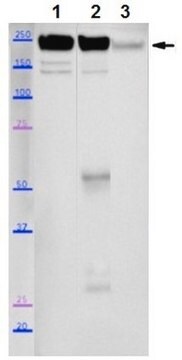ZRB2186
Anti-Myosin-10 Antibody, clone 1B3 ZooMAb® Rabbit Monoclonal

recombinant, expressed in HEK 293 cells
Synonym(s):
Myosin-10;Cellular myosin heavy chain type B;Myosin heavy chain 10;Myosin heavy chain non-muscle IIb; Non-muscle myosin heavy chain B;NMMHC-B:Non-muscle myosin heavy chain IIb:NMMHC II-b;NMMHC-IIB
About This Item
Recommended Products
biological source
rabbit
Quality Level
recombinant
expressed in HEK 293 cells
conjugate
unconjugated
antibody form
purified antibody
antibody product type
primary antibodies
clone
1B3, recombinant monoclonal
description
1B3 Clone
product line
ZooMAb® learn more
form
lyophilized
mol wt
calculated mol wt 229 kDa
observed mol wt ~230 kDa
purified by
using Protein A
species reactivity
rat, mouse, monkey, human
packaging
antibody small pack of 25 μL
greener alternative product characteristics
Waste Prevention
Designing Safer Chemicals
Design for Energy Efficiency
Learn more about the Principles of Green Chemistry.
enhanced validation
recombinant expression
Learn more about Antibody Enhanced Validation
sustainability
Greener Alternative Product
technique(s)
affinity binding assay: suitable
immunohistochemistry: suitable
western blot: suitable
isotype
IgG
epitope sequence
C-terminal
Protein ID accession no.
UniProt accession no.
greener alternative category
, Aligned
shipped in
ambient
storage temp.
2-8°C
target post-translational modification
unmodified
Gene Information
human ... MYH10(4628)
General description
Specificity
Immunogen
Application
Evaluated by Western Blotting in C6 cell lysate.
Western Blotting Analysis: A 1:1,000 dilution of this antibody detected Myosin-10 in C6 cell lysate.
Tested Applications
Western Blotting Analysis: A 1:1,000 dilution from a representative lot detected Myosin-10 in lysates from COS-7 and NIH3T3 cells and Human brain tissue and Mouse brain tissue.
Affinity Binding Assay: A representative lot of this antibody bound Myosin-10 peptide with a KD of 9.6 x 10-8 in an affinity binding assay.
Immunohistochemistry (Paraffin) Analysis: A 1:100 dilution from a representative lot detected Myosin-10 in human cerebellum tissue sections.
Note: Actual optimal working dilutions must be determined by end user as specimens, and experimental conditions may vary with the end user
Target description
Physical form
Reconstitution
Storage and Stability
Legal Information
Disclaimer
Not finding the right product?
Try our Product Selector Tool.
Storage Class Code
11 - Combustible Solids
WGK
WGK 1
Flash Point(F)
Not applicable
Flash Point(C)
Not applicable
Regulatory Listings
Regulatory Listings are mainly provided for chemical products. Only limited information can be provided here for non-chemical products. No entry means none of the components are listed. It is the user’s obligation to ensure the safe and legal use of the product.
JAN Code
ZRB2186-25UL:
ZRB2186-4X25UL:
Certificates of Analysis (COA)
Search for Certificates of Analysis (COA) by entering the products Lot/Batch Number. Lot and Batch Numbers can be found on a product’s label following the words ‘Lot’ or ‘Batch’.
Already Own This Product?
Find documentation for the products that you have recently purchased in the Document Library.
Our team of scientists has experience in all areas of research including Life Science, Material Science, Chemical Synthesis, Chromatography, Analytical and many others.
Contact Technical Service







